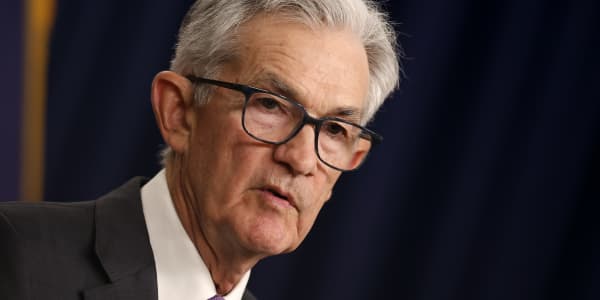This report is from today's CNBC Daily Open, our new, international markets newsletter. CNBC Daily Open brings investors up to speed on everything they need to know, no matter where they are. Like what you see? You can subscribe here.
What you need to know today
Clawing back losses
U.S. stocks rallied Monday after the S&P 500 fell into correction territory last week. The Dow Jones Industrial Index had its best day since June. Asia-Pacific markets mostly fell Tuesday. China's Shanghai Composite dipped 0.38% as the country's manufacturing activity in October unexpectedly contracted. But Japan's Nikkei 225 added 0.22% after the Bank of Japan announced its monetary policy decision.
BOJ relaxes control
The Bank of Japan announced it'll allow more flexibility in its yield curve control policy, taking the 1% upper limit of the government's 10-year bond "as a reference." However, the central bank kept its short-term policy rate unchanged at -0.1%. The BOJ also revised its inflation outlook for Japan higher, forecasting core CPI to hit 2.8% and 1.7% for the fiscal years 2024 and 2025.
Farewell to bad memories
Samsung Electronics' third-quarter operating profit came in at 2.43 trillion Korean won ($1.79 billion). Year over year, that's a 77.6% plunge. But quarter on quarter, the figure's a 262.6% leap and higher than estimated — a sign the firm may be emerging from a memory chip glut that hollowed out its profits.
Bumpy road for Tesla
Tesla shares sank nearly 5% after Panasonic said it was reducing production of electric batteries because of flagging demand for Tesla's vehicles. Earlier in the month, Tesla CEO Elon Musk cautioned shareholders high interest rates are forcing the company to keep prices low and hampering consumers' ability to spend. Shares of the EV maker have dropped more than 18% since Musk's warning.
[PRO] A monetary policy misstep?
The Federal Reserve is widely expected to keep interest rates unchanged at the close of its two-day meeting Wednesday. The central bank's also expected to reiterate its narrative of "higher for longer" rates. But the Fed has been notoriously off the mark when it comes to predictions about monetary policy, writes CNBC's Jeff Cox.
The bottom line
After a rough week amid accelerating inflation and disappointing earnings, stocks bounced to start the week.
The Dow Jones Industrial Average broke its three-day losing streak and climbed 1.58% for its best day since June 2. The S&P 500 rose 1.2%, its best daily performance since Aug. 29, and also halted a three-day drop. The Nasdaq Composite gained 1.16% for its second positive session.
Technology stocks largely led the surge Monday. In fact, Fundstrat's Tom Lee thinks this group of tech megacaps can push the S&P higher not just for the day, but until the end of the year.
Other analysts also see a shift in the winds. "Investors are finally feeling a little bit more confident that perhaps we priced in enough bad news and that's really manifesting in a stronger market today," said Art Hogan, chief market strategist at B. Riley Financial.
The Federal Reserve meeting concludes Wednesday — the central bank is expected to keep interest rates unchanged — and might also give stocks a fresh tailwind. If the Fed does hold rates at the same level, Hogan thinks it "may signal that the cycle of raising rates is over," which might "stop that parabolic rise we've seen in Treasury yields," he said.
Additionally, news that the U.S. Department of the Treasury will borrow less than expected for the final quarter will likely console investors concerned about rising bond yields. Lower Treasury yields — or at least a pause in their increases — eases borrowing costs, giving the economy and financial markets more room to breathe.
However, it might be too early to let your guard down. Ari Wald, head of technical analysis at Oppenheimer, wrote that the S&P's "correction since July hasn't run its course." Wald thinks the broad-based index will dip to 4,050 — around 100 points lower than its Monday close — before reversing losses.
But the S&P might not even correct itself, said Morgan Stanley chief U.S. equity strategist Mike Wilson. On the contrary, Wilson — who's one of the most bearish strategists on Wall Street, according to CNBC's Market Strategist Survey — thinks the S&P will fall to 3,900 at the end of the year.
The spread in opinions make the picture ahead murky, but, ironically, it does make one thing clear: markets are increasingly volatile. Investors would do well to guard against more wild swings.





